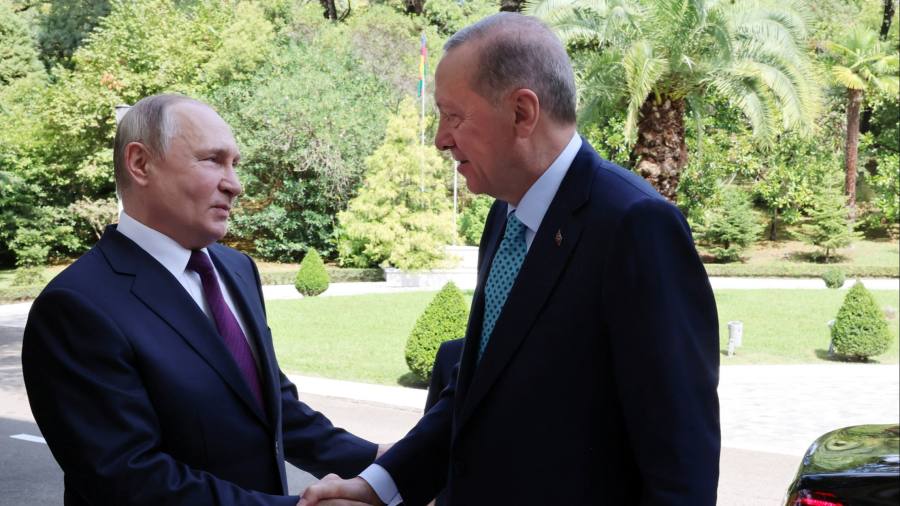
Receive free War in Ukraine updates
We’ll send you a myFT Daily Digest email rounding up the latest War in Ukraine news every morning.
Russian president Vladimir Putin said Moscow was “open to negotiations” about returning to a UN-brokered Black Sea grain deal, ahead of a meeting with Turkey’s Recep Tayyip Erdoğan.
Giving a joint statement before today’s meeting in the city of Sochi, Putin said the two sides “would not bypass issues, related to the Ukrainian crisis”.
“I know you want to raise the question about the grain deal. We are open to negotiations,” Putin said.
Erdoğan said any agreement on the grain deal would be “very important” for developing countries in Africa. “The world is waiting for what will be the result from here today,” Turkey’s president said.
Putin and Erdogan’s meeting comes nearly two months after Moscow pulled out of the grain agreement, which had allowed roughly 33mn tonnes of grain to be exported from Ukraine across the Black Sea.
Erdoğan has sought to position himself as a middleman between Russia and the west. Ankara has declined to sign up to western sanctions on Russia, and the two countries have deepened their economic ties since the Ukraine war began last year. Turkey, a Nato member, played a key role in negotiating the initial grain agreement, which was negotiated in July 2022.
More than half of the food had been delivered to developing countries, including Turkey, according to the deal’s co-ordination committee. Russia’s exit from the agreement has sparked fears of a potential food crisis in parts of Africa, the Middle East and Asia.
Without safe access to Black Sea ports, Ukraine’s farmers have been forced to reroute their grain exports via land and its Danube ports. These routes carry significantly higher costs and could lead them to plant fewer crops, exacerbating fears of a food shortage down the line.
In a sign of the extent to which the situation has deteriorated in recent weeks, Russia has launched a series of attacks on Ukraine’s southern Odesa region including its Danube ports such as Izmail. Kyiv claimed overnight strikes on Monday crashed across the river on to the territory of Nato-member Romania.
The European Commission said the “general expectation is that Russia at least rejoins the Black Sea grain deal” and that it would stop “targeting especially the Ukrainian grain export”.
The strikes on Danube ports “further demonstrate how Russia is exacerbating the global food crisis with its actions which are putting at risk millions of vulnerable people around the world,” the commission added.
Ahead of the meeting with Erdoğan, Moscow had laid out a list of demands for rejoining the accord. Russia has long alleged that the original deal was unfairly implemented, claiming that western sanctions had prevented the enforcement of a parallel deal to allow Moscow’s own agricultural exports.
Western diplomats said Moscow had been particularly aggravated because it was unable to export ammonia, a key fertiliser ingredient, through Ukrainian controlled territory.
Additional reporting by Alice Hancock in Brussels